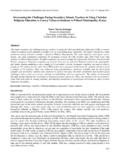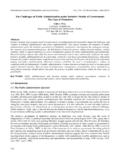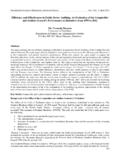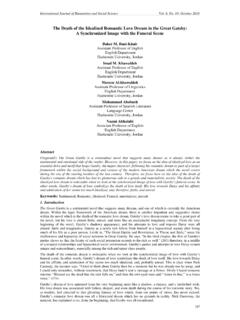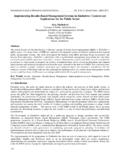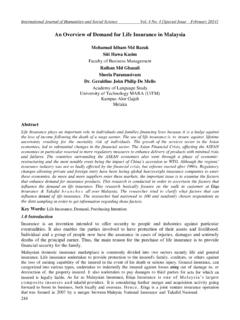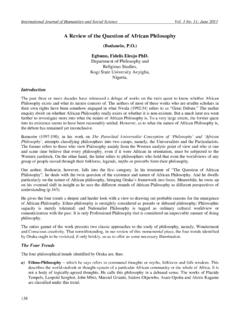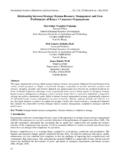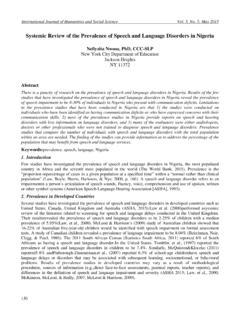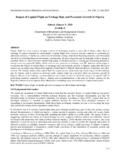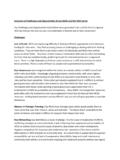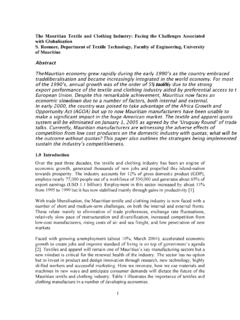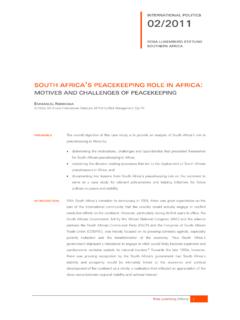Transcription of The Challenges Facing Religion in the …
1 International Journal of Humanities and Social Science Vol. 4 No. 3; February 2014 322 The Challenges Facing Religion in the Contemporary World: The Kenyan Situation Ogolla Maurice Catholic University of Eastern Africa, Kisumu Campus Kenya Introduction This presentation focuses on the Challenges Facing Religion in the contemporary world with the Kenyan situation in focus. It is divided into five sub-topics namely an introduction, the concept of Religion , Religions in Kenya and the Challenges Facing them followed by a conclusion and references.
2 Religion is one of the terms most widely talked about in the world today. In most cases, people focus on its expressions or manifestations rather than its essence which actually should be the major area of concern. Institutions, societies, disciplines and peoples in general attribute to it their own views or meanings depending on each one s area of specialization. In this regard, therefore, we can only talk of or access what Philosophers, Theologians, Sociologists, Phenomenologists, Psychologists, Historians and others take Religion to mean. People in each discipline give their own understanding of this subject which is never the same as any other.
3 This is what leaves us with a puzzle as to what exactly the essence of Religion is. To date, the world has not realized any one universally accepted definition of Religion . According to Rahner (1981) the possible root of the term Religion is the Latin word religio with its different verb forms relegere , religari and reeligere Relegere means to constantly turn to or conscientiously observe Religari can mean binding oneself to one s origin and goal Reeligere means choosing again to live religiously by one s origin and goal These three suggests that there is an object connected with the goal and origin of life that people constantly turn to through Religion .
4 If this is the case then this object must be an ultimate concern, meriting and demanding people s careful attention, Rahner concludes. Furthermore, if this be the case then one s origin and goal are so essentially connected to the person that he/she has to bind him/herself to them. All these do not provide any tangible meaning of Religion since they suggest an idea of a god who is the origin and goal of human life. This would exclude classical Buddhism, forms of Hinduism and several other religions that do not center on a god. Cox (1992), observes that most of the definitions of Religion are either vague or prejudiced.
5 Some psychological definitions of Religion include Sigmund Freud s (1907) observation that it is a universal obsession, a neurosis and an attempt to control the oedipal complex. This observation connects Religion with some complexes in a person s psyche which is obviously very narrow. A well known philosophical definition by Paul Tillich that Religion is the ultimate concern appears to be vague since it doesn t clarify what this ultimate concern is as human beings have so many ultimate concerns. Edward Taylor on the other hand offered a more theological definition by observing that Religion is belief in spiritual beings, this again excludes some religions.
6 These are just but examples of definitions that show that Religion is not easy to define. We should note also that there is not even one African community that had the name Religion in their language. All the terms used for it are borrowed and so do not exactly tell us what it is essentially. The term Dini is commonly used by most Kenyan communities but it is Arabic for denomination, a small group of worshippers, which is not Religion Most scholars simply talk of a working definition. Such working definitions include the sociologists versions as; A socially organized pattern of beliefs and practices concerning ultimate meaning and that assumes the existence of the supernatural.
7 A system of beliefs and practices that is relative to superhuman beings. A varied, symbolic expression of that which people appropriately respond to as being of an unrestricted value for them (Cox, 1992). Center for Promoting Ideas, USA 323 As we can see, these are called working definitions, describing or defining the same term differently. Our conclusion therefore is that the term Religion is very difficult to define and there is no such definition as a universal one. Mbiti, J.
8 S. (1975) describes the concept in an African s understanding as that which sums up beliefs, values and morals, places and objects and officials and leaders considered to be religious. In this paper, therefore, we will take this latter meaning of Religion , that is, that consisting of societies and their beliefs, values, morals, places, leaders and objects used during rituals, connected with such beliefs. Religions in Kenya There are almost all the religions of the world like African Religion , Islam, Christianity, Judaism, Jainism, Buddhism, Hinduism, Judaism and Sikhism in Kenya. While most of these religions are restricted to people from certain parts of the world only for example Hinduism India, Judaism Israel and Taoism China, Christianity, African Religion and Islam on the other hand have adherents who are Kenyans in origin and as such are the ones that this paper will concentrate on.
9 African Religion is that practiced by all indigenous peoples of Africa. It was and is actually still practiced by many indigenous Africans. I have used both the past and present here because as Magesa (1977) notes, many philosophers, theologians and students of Comparative Religion still feel that it is primal or ethnic . For this matter, such people still tie the Religion to magic and fetishism. The Religion may not have had a founder, written scriptures, converts or missionaries but it still organizes the lives of Africans just as the other world religions do to their adherents. Africans have been described by Mbiti (1969) as notoriously religious meaning that their Religion is part and parcel of their life and may not be separated from it.
10 There is no clear distinction between the profane and religious or the secular and the sacred as Religion and culture are intertwined. They are thus one and the same thing to the extent that what one can call his/her culture is also found in his or her Religion , likewise, what one can call his or her Religion is in his or her culture. African Religion as Kirwen (2008) observes is rooted in the people s politics, economics, aesthetics, ethics, artifacts and belief systems. When keenly observed, Africans depended on elders and their wise counsel for the leadership of the community. This started right from the family unit in which the father was the high priest followed by the first wife and the first son.
